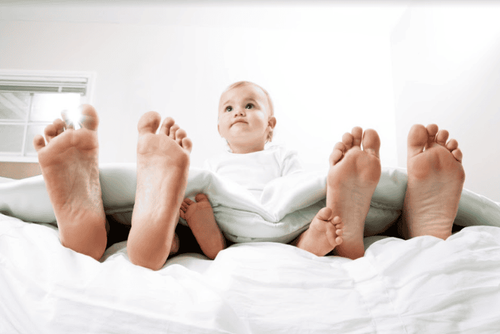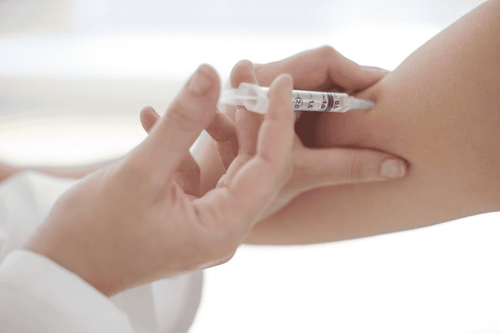This is an automatically translated article.
The article was professionally consulted by MSc, Dr. Trinh Thi Thanh Huyen - Obstetrician and Gynecologist - Department of Obstetrics and Gynecology - Vinmec Hai Phong International General Hospital.Pregnancy and childbirth lead to a lot of changes in the body as well as the sex life. Vaginal tissue is thinner and more sensitive due to changes in hormone levels and vaginal pH, making sex after childbirth painful. The vagina, uterus and cervix have not returned to their normal size leading to a decrease in sex drive.
1. How does childbirth affect sex?
Having sex after giving birth will make a lot of difference. A small study conducted in 2005 found that 83% of women had sexual problems within 3 months of having their first child. But over time, things will gradually get better. Common problems affecting postpartum sex include:1.1. Vaginal dryness Hormones play a big role in physical recovery, as well as the ability to return to normal sexual activity. During the first few days immediately after childbirth, estrogen drops to pre-pregnancy levels, or lower if a mother breastfeeds. Estrogen helps create natural lubrication in the vagina, so low levels of this hormone will make the vagina drier and more sensitive in the first few weeks postpartum.
1.2. Thinner Vaginal Tissue Thinner vaginal muscles are more prone to tearing, irritation, or injury during sex, increasing the risk of infection. The vagina can even become inflamed and swollen, so bleeding is not uncommon.
1.3. The "loose", loss of elasticity in the vagina Birth often temporarily stretches the vaginal canal, so it takes time for these muscles to regain strength and stability.
1.4. Tear or cut - perineal stitches Women who have a tear or cut - perineal stitches to widen the vaginal canal during labor may have to wait longer. Having sex again too soon can increase the risk of complications, such as postpartum bleeding and uterine infections.
1.5. Bleeding In the weeks immediately after giving birth, you'll likely experience frequent bleeding as your uterus heals. Sex can cause further blood loss. If the condition doesn't stop within 4-6 weeks or gets worse, see your doctor for treatment.
1.6. Pain during sex Sex after a cesarean section can also affect vaginal sensations. Similar hormone problems can make vaginal tissues dry and thin, leading to painful sex after delivery. In addition, women who have a caesarean section need time to recover from abdominal surgery. Therefore, make sure the incision is completely healed before having sex again.

Quan hệ sau sinh mổ cũng có thể ảnh hưởng đến cảm giác âm đạo
Because breastfeeding keeps estrogen levels low, it can take a long time for your sex drive to return. However, experts do not recommend that women who are breastfeeding take estrogen supplements because it can affect milk production.
Besides the hormonal changes, the fatigue of taking care of a newborn can make both couples feel less intimate than before. By the time your body adjusts to the new normal or stops breastfeeding, the hormones will start to work again, and the desire for sex will gradually appear. One study found that 89% of women resumed sexual activity within 6 months of giving birth.
In general, your body needs some time to rest after giving birth. There is no specific timeline for returning to sex after giving birth. However, most doctors recommend that women wait 6 weeks after a vaginal delivery.
After this time, you still need to do sexual activities slowly. In addition to physical recovery, you'll also have to adjust to a new family member, sleep less, and change your routine.

Bên cạnh việc thay đổi nội tiết tố, sự mệt mỏi khi chăm sóc một đứa trẻ sơ sinh có thể khiến cả hai vợ chồng không còn cảm giác thân mật như trước
2. Possibility of getting pregnant again
The ability to get pregnant again after giving birth may appear earlier than you think. One study found that the first ovulation for non-breastfeeding women is around 6 weeks. If you're breastfeeding, hormones can control birth "naturally" for the first 4-6 months after giving birth. Specifically, breastfeeding for birth control is 98% effective in women who:Less than 6 months postpartum Still exclusively breast-feeding Have not yet started menstruating However, only about a quarter of women Use the lactational amenorrhea method (LAM), or complete breastfeeding to prevent pregnancy, properly. This in turn increases their risk of pregnancy.
If you plan to have sex after having a baby, but don't want to get pregnant again soon, plan to use a safe method of birth control. For example, condoms, implants, or an IUD may also be used. Of note, hormonal birth control pills can affect breast milk and come with certain risks, including an increased risk of blood clots. So, talk to your doctor about the birth control option that's best for you.
Getting pregnant too soon after giving birth increases the risk of premature birth or birth defects. Health care professionals encourage women to space between pregnancies, at least 12-18 months. If you are looking for another baby, ask a medical professional who knows your health history best to make appropriate recommendations.
3. Tips for a healthy sex life after giving birth
You can still have healthy and fulfilling sex after childbirth by:No rush During the first weeks of having sex again, your body is not ready to perform the activities yet. Act like before pregnancy. So start slowly and gradually increase the level each day. Try intimate movements to warm up, such as massage.
Focus on foreplay This is the time for the vagina to produce its own natural lubricant. Should prolong foreplay, stimulate each other or perform suggestive movements before actual penetration and intercourse.
Use Lubricant You may need a little lubricant to help when the hormones have not stabilized. Choose a water-based lubricant because the oils are oil-based to avoid damaging the condom and irritating sensitive tissues.
Kegel exercises Kegel exercises help tone the pelvic floor muscles, thereby solving common postpartum problems, like urinary incontinence. Exercising the muscles can also help you regain strength and sensation in your vagina.

Bài tập Kegel giúp làm săn chắc cơ sàn chậu, từ đó giải quyết các vấn đề phổ biến sau sinh, như tiểu không kiểm soát
Talk to your partner Sex life after giving birth is definitely different, but it won't be for the worse. New things can be exciting. It is important that you talk openly with your partner about the positives and negatives, likes and dislikes. This will help you get interested in sex again, avoiding silently suffering from painful postpartum sex.
Pregnancy and childbirth change your body a lot, so it's a good idea to spend about 6 weeks recovering before having sex again. During this phase, the uterus will contract, hormones return to their previous levels, and pelvic floor muscles regain strength and stability. When you're ready, make sure to make time for it properly. If you experience any unusual pain or symptoms, tell your doctor. Painful postpartum sex can be a sign of other medical conditions that are not related to the postpartum recovery process.
Vinmec International General Hospital is the address for examination, treatment and prevention of many diseases, including Obstetrics and Gynecology. Therefore, if after giving birth, the mother encounters difficulties in taking care of her children, difficulties in recovering her health, she can go to Vinmec to examine and identify diseases to ensure her health as well as take care of her health. a comfortable mind. With the dedication and enthusiasm of the medical team, modern facilities will definitely make you satisfied.
Please dial HOTLINE for more information or register for an appointment HERE. Download MyVinmec app to make appointments faster and to manage your bookings easily.
Reference source: healthline.com












